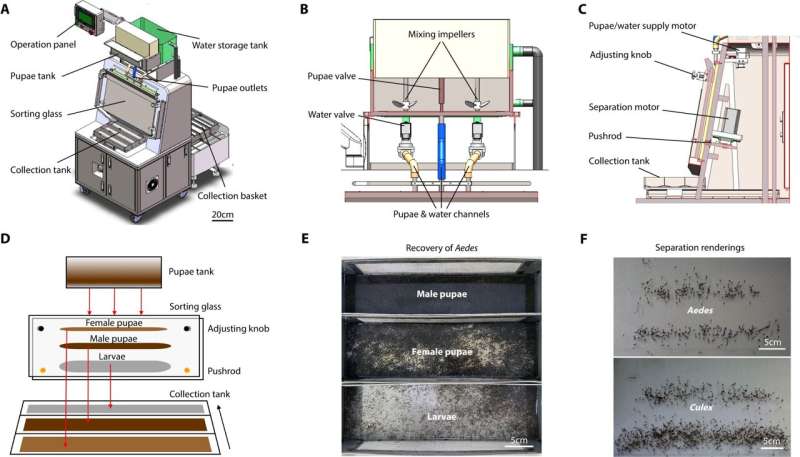
A team of engineers and pest control specialists in China has developed a machine that is capable of gender-sorting 16 million mosquito pupae a week. In their paper published in the journal Science Robotics, the group describes how they designed and built their sorter and how well it has worked during testing.
Prior research has shown that mosquitoes carry viruses such as Zika, West Nile, Chikungunya and dengue, as well as parasites such as those responsible for the spread of malaria. Scientists have been looking for efficient ways to reduce their numbers in places that are most susceptible to the diseases they spread.
One approach involves breeding millions of sterile male mosquito pupae and releasing them into the wild. The sterile pupae develop into mosquitos that take the place of fertile males in mating with females, resulting in fewer viable mosquito larvae and eventually fewer mosquitoes overall. Such breeding efforts require that the female mosquitos produced during breeding are not released into the wild; thus, the pupae need to be sorted by gender.
Currently, the process is inefficient because it is done manually. The research team developed a machine that is able to do the job automatically, approximately 17 times faster and with fewer mistakes—which the researchers claim comes to approximately 17 million pupae a week. The researchers note that the machine, which has a special sorting glass, is capable of collecting, loading and sorting millions of pupae every day.
The research team has already tested their sorting machine on two kinds of mosquitoes in parts of Guangzhou, China. They report that use of their sorting machine resulted in significant reductions in mosquito populations in the area. During testing, they also discovered that their device was so easy to operate that one person could run several of them at the same time. Several of the machines have already been sold to customers in Italy, France, the U.S., and Mexico.
More information: Jun-Tao Gong et al, Upscaling the production of sterile male mosquitoes with an automated pupa sex sorter, Science Robotics (2024). DOI: 10.1126/scirobotics.adj6261
© 2024 Science X Network
Citation: Sorting machine separates 16 million mosquito pupae a week, greatly reducing population (2024, August 1) retrieved 1 August 2024 from https://techxplore.com/news/2024-08-machine-million-mosquito-pupae-week.html
This document is subject to copyright. Apart from any fair dealing for the purpose of private study or research, no part may be reproduced without the written permission. The content is provided for information purposes only.
